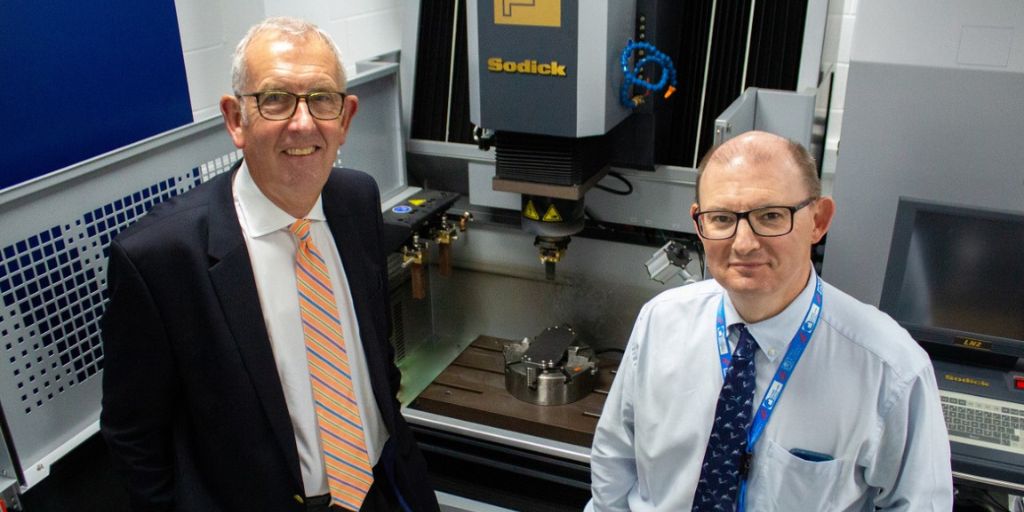
A partnership which aims to fast-track innovation in medical and healthcare technologies and better understand clinical and nursing needs in Scotland has been announced by Heriot-Watt University and InnoScot Health.
The five-year agreement will see Heriot-Watt University’s Medical Device Manufacturing Centre (MDMC) collaborate with InnoScot Health to help bring new ideas and innovations from healthcare professionals to life.
The strategic relationship will initially focus on identifying new healthcare technologies and the development of prototype medical devices by engaging with clinicians, doctors, nurses, and engineering students.
Based at Heriot-Watt University’s Edinburgh campus, the MDMC is a consortium including the University of Edinburgh, the University of Glasgow and Robert Gordon University and helps Scotland’s SMEs to translate medical device concepts into commercial products. Offering free expert advice on, and access to, manufacturing engineering, regulatory issues, and funding, its staff provide technically supported access to its £2M specialist manufacturing facilities.
InnoScot Health, formerly known as Scottish Health Innovations, works in partnership with NHS Scotland, providing expert intellectual property advice, regulatory expertise, and project management services to support the development and commercialisation of clinical products.
In addition to the new partnership’s research and development ambitions, both organisations will work to develop joint Continual Professional Development (CPD) and training programmes that further develop staff from both organisations in regulatory issues relating to medical devices.
Graham Watson, Executive Chair of InnoScot Health, said: “This mutually beneficial agreement builds on our successful long-standing relationship with Heriot-Watt University and pools our significant collective expertise. It is a landmark moment that will serve to accelerate medical and healthcare opportunities in the first instance with vast possibilities thereafter.
“We are in no doubt that Heriot-Watt’s considerable enterprise credentials and status as a leading innovation and research institution can match our own ambitions whilst helping to underpin our own development aims in the sector.
“We believe it will be a very successful working arrangement for both parties – from the co-creation of novel medical devices with clinicians, doctors, nurses, and engineering students, to working with Heriot-Watt University to develop joint Continuous Professional Development and training programmes to further develop staff from both organisations.”
Professor Marc Desmulliez, manager of the MDMC at Heriot-Watt University, said: “Scotland is renowned for its innovation in health, pioneering techniques and medical devices that are now used worldwide.
“In just two years, the MDMC has created a unique business collaboration model, working with more than 60 companies, accelerating the progression of ideas to market and the adoption of medical devices into clinical settings. Specialist training is fundamental to our continued success and we are confident this new strategic partnership will further accelerate Scotland’s innovative medtech SMEs, ultimately benefitting and improving patient care. We are looking forward to putting this partnership into practice.”
Dr Gillian Murray, deputy principal for business and enterprise at Heriot-Watt University, said: “Entrepreneurialism and collaboration lie at the heart of Heriot-Watt University. This partnership has enormous potential to positively impact Scotland’s medical device sector by working closely with clinical individuals and teams that have a first-hand understanding of our healthcare technology needs and the solutions needed to meet them.
“Combining InnoScot Health’s extensive background in commercialisation and regulation with the expert manufacturing engineering guidance of the MDMC will allow us to accelerate medical device innovation across Scotland and beyond.”
Companies supported by the MDMC since its launch two years ago (2020) include Confidence Plus which makes a device for dignity to contain stoma bag leaks. The MDMC helped Confidence Plus to become the first Scottish organisation to trial new software licensed by NICE for assessment of the company’s product in healthcare management settings.
At the height of the pandemic, the facility also worked with additive manufacturing specialist Abergower to develop a new manufacturing facility in the company’s premises, mass producing 3D printed COVID-19 testing swabs. These types of swabs are now being used by more than 20 million people in the USA. The nasopharynx 3D printed swabs provided a less intrusive experience compared to traditional cotton bud swabs – cutting testing time, reducing anxiety and minimising discomfort for patients.








